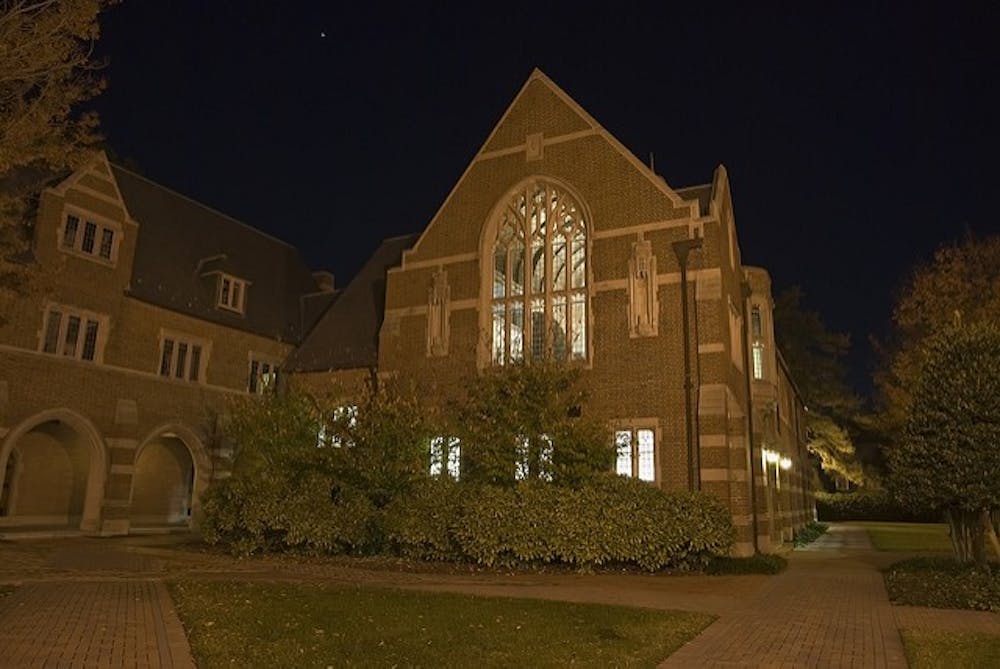Here’s your weird, outside-of-the-box puzzle for today: Try to discern the correlation between the systemic oppression of minority groups that for more than two centuries has hindered our United States from amounting to the ideals outlined in its founding document and the two-year stint wherein I tap danced at my hometown’s Academie De Ballet, which required me to wear sparkly pants and a barf-green leprechaunish tunic.
Stumped? Well, I’ll let you in on it – they’re both things I think many people really want to pretend never happened. I know I do, at times.
Last Thursday, I hunkered down in Jepson Hall to attend a talk pertaining to this very subject. (The one that concerns American history as opposed to prepubescents awkwardly flapping feet to the tune of “Chattanooga Choo Choo,” that is.) Along with leadership professor Julian Hayter, Craig Steven Wilder, an MIT professor and author of the book "Ebony & Ivy" visited campus to assist with a discussion dealing with the remembrance of our nation’s troubling legacy of racial injustice, particularly, but not limited to, on college campuses.
The topic hit close to home. As a black student attending a university in Richmond, Virginia, the quondam capital of a failed nation-state not precisely founded on the premise that folk should be given equitable treatment regardless of the hue of their skin, I think about it a lot.
I know I can’t be the only one, either, given the current controversy over renaming buildings and tearing down monuments honoring historical figures known for their alleged prejudice. Just recently, the Henrico School Board voted to restyle Harry F. Byrd Middle, whose namesake was an ardent segregationist. There are even buildings on our own campus that students have called for renaming. You and I probably walk past them every day.
Here’s an example. After the talk on Thursday, I did some extensive research (i.e. a Google search) on the university’s first president, Robert Ryland, to see if there were any reasons to hold him in contempt. Well, the man was a slaveowner who purportedly thought that enthralling Africans was the surest way to convert them Christianity. That’s definitely unfortunate, although Ryland isn’t unique among historical figures who possessed human chattel – look no further than Ulysses S. Grant and George Washington. In any case, should we rename Ryland Hall because of this?
I’m not entirely sold. To do so, I think, would be to simply sweep the issue that our university’s first president owned slaves under the rug. And as any messy kid can attest to, merely hiding your mess does little in the way of actually cleaning it up.
On this note, I think Dr. Wilder would agree with me. He told us that the typical failure of American universities to address the racist realities of their past is ultimately harmful, and hardly assists in helping us reconcile it with our present.
This can be applied, I think, on a national scale. How can we ever hope to understand and come to terms with the country’s racist past if we just plug our eats, cover our eyes and attempt to wish it away? I don’t believe we can.
Of course, this issue has many layers. I can say with certainty that there are historical figures who do not deserve buildings, schools and cities named for them. But instead of calling for their immediate rechristening, we would do well to use them as a springboard for more vigorous discussion about why our ancestors saw fit to name things in their honor. More conversations such as that, I believe, are needed if we are ever to confront the racial disparity that still plagues us to this day.
That’s just my two cents.
Contact columnist Hunter Moyler at hunter.moyler@richmond.edu
Enjoy what you're reading?
Signup for our newsletter
Support independent student media
You can make a tax-deductible donation by clicking the button below, which takes you to our secure PayPal account. The page is set up to receive contributions in whatever amount you designate. We look forward to using the money we raise to further our mission of providing honest and accurate information to students, faculty, staff, alumni and others in the general public.
Donate Now



